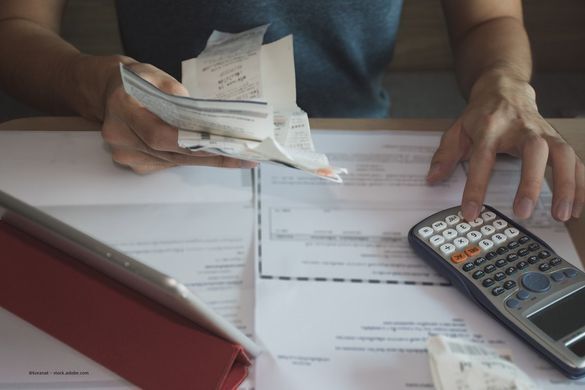Help with personal bankruptcy - duration, process and costs
Can't find a way out of the debt trap? Our debt counseling will help you regain control of your private financial situation. This is possible throughout Germany via Zoom, WhatsApp, Telegram or signal telephony. For those seeking help in the greater Stuttgart area and the surrounding area, we offer certified personal debt counseling in private. Personality and fairness come first!
Debt-free in just three years
The good news about the period! >> Since the end of 2020, new rules on the duration of private insolvency
- Due to an insolvency law reform, you can be debt-free after 3 years as a result of personal bankruptcy. Before that, a period of up to 6 years applied. During the three years, you must pay the attachable portion of your income to a so-called trustee. The trustee thus pays off part of your debt. You do not have to pay off a minimum amount of debt before you receive the so-called residual debt exemption. Important: *Maintenance debts and tax debts are not exempt from personal bankruptcy.

What happens in personal bankruptcy?
From the point at which you commission our debt advice, you must first pay the monthly No longer paying to creditors (e.g. loan installments, account repayments). The legislator also grants indebted people a subsistence level in the event of personal bankruptcy. Only amounts above the garnishment exemption limit are seized. This depends on your particular life situation. The corresponding numbers can best be found in the current seizure table. If you comply with the regulations and agreements with the insolvency practitioner for three years, you will be legally debt-free after only three years.
A brief overview of the process of private insolvency
Decision to apply for personal bankruptcy and lead time (approx. 2 months) Application for personal bankruptcy at the relevant insolvency court The insolvency court examines the application and opens insolvency proceedings. An insolvency administrator is appointed. He represents the interests of the creditors and conducts the insolvency proceedings. As a debtor, you must provide information about your assets. = Disclosure of all financial circumstances. Surrender a large part of your attachable income* to the insolvency administrator in order to satisfy the creditors.>> As a debtor, you are obliged to pay a certain minimum amount to your creditors during the insolvency proceedings. Completion of the insolvency proceedings after about 3 years. (Usually 3 years, as of 2023 / 2024) Have all the requirements been met? You will then be granted discharge of the residual debt. >> You are freed from your debts. If you have not met the requirements, the bankruptcy proceedings can be extended or even suspended.
On this page you will find out roughly what you still need to pay attention to.
Preparing the bankruptcy application - you should pay attention to this
When preparing for personal bankruptcy, the following points should be considered:
- Accurately list debts: It is important to record and list all debts and creditors so that all debts are taken into account in the insolvency proceedings. Out-of-court debt settlement plan: Before the insolvency proceedings of the personal bankruptcy are opened, an attempt must be made to reach an out-of-court settlement with the creditors. Disclose assets : It is important that all assets and income are declared in the insolvency proceedings. Legal support: We can support you with this. It can make sense to seek the support of a lawyer or a debt counseling center.
Observe deadlines: It is important to meet the deadlines in insolvency proceedings in order not to delay the process. New text
What you need to consider when filing for personal bankruptcy
A bankruptcy petition must be filed with a bankruptcy court. It is important to submit all relevant documents, such as proof of income and a list of creditors with outstanding claims. It is advisable to seek the assistance of a specialized lawyer or a debt advice center in order to fill out and submit the application correctly. The SIC Schuldern-Insolvenz-Centrum e. V. you with over 10 years of experience.
What you need to know about the list of creditors
Bei der Anfertigung der Gläubigerliste ist in einer Privatinsolvenz höchste Sorgfalt geboten. Sie als potentieller Schuldner muss beim Antrag zur Insolvenz genau wissen, wie viele Gläubiger Sie haben. Zudem, wie hoch die einzelnen Forderungen der jew. Gläubiger sind. All diese Informationen werden in einer übersichtlichen Gläubigerliste zusammengetragen und Ihrem möglichen Antrag bei Start des Insolvenzverfahrens beigelegt.
Private bankruptcy and Schufa What are the consequences?
Eine Privatinsolvenz wird in der Regel in der Schufa eingetragen. Das bedeutet, dass der Eintrag für mehrere Jahre bestehen bleibt und sich negativ auf die Bonität auswirkt.
The following is important to know for the Schufa entry:
- Moving house: You have a negative Schufa entry because of the insolvency and landlords don’t like that at all. Finding a new apartment will not be easy in this phase. Changing contracts and providers will be made more difficult: Before the contract is signed, telephone providers, for example, will always ask the Schufa or similar. Extended period of the Schufa entry: Beyond the residual debt exemption (max. three years) the Schufa entries are retained
However, as a debtor, you can also use personal bankruptcy as an opportunity and gradually improve your own financial situation again in the long term.
>> For further additional information, please refer to our personal insolvency FAQ at the end of this page.
This is how we support you in the event of personal bankruptcy
The SIC debtor insolvency center e. V. is there for you. With us you get a certified contact person with a lot of experience and the necessary qualifications who will support you on your way through personal insolvency. With no waiting times and good telephone availability, you benefit from extensive support with us that goes beyond pure bureaucracy. You no longer have to open your letters. Simply forward your mail directly to us. Our advisors sort the mail for you and help you to get an overview of the situation again. You will receive an orderly inspection from us by post or other means.
ALL necessary downloads & forms on the subject of insolvency can be found here:
Seizure table, insolvency checklist, record sheet, budget

Call us and find out in a free initial consultation whether personal bankruptcy is worthwhile for you.
Personal bankruptcy - FAQ
-
How much does personal bankruptcy cost me: from a lawyer to advice?
The costs of a personal bankruptcy can vary depending on the scope and duration of the procedure. Legal and court costs, as well as costs for debt counseling and other expenses may be incurred. It is advisable to find out more about the costs and financing options from us in advance.
-
Does personal bankruptcy affect marriage and partnership?
It is important for you to know that personal bankruptcy can affect not only the applicant but also their spouse. In principle, however, the spouse is not affected by the personal bankruptcy of the other.
-
Can I keep my vehicle (e.g. car)?
If the car has not yet been paid off and is used as collateral for a loan, it can be handed over as part of the bankruptcy. In this case, the car is sold and the proceeds are used to pay off the debt.
-
How do I protect my finances during personal bankruptcy?
During the insolvency proceedings, it is important to continue to keep a close eye on your own finances and to stick to the plan drawn up by the insolvency court.
-
What do I have to consider as a pensioner?
Pensioners can also file for personal bankruptcy. However, they have to observe special regulations.
⟟ Hauptstr. 115
70771 Leinfelden-Echterdingen
☎ 0711 16036757
✉ poststelle@mail-sic.de
- Insolvency advice
- Private insolvency
- Corporate insolvency
- P-account certificate
- garnishment allowance
- Credit without Schufa
- Admission form
- NOW discover insolvency application cost reimbursement protection
- Coching in Cyprus
- Mon - Fri
- - -
- Saturday
- -
- Sunday
- Closed
*Appointments on Saturdays only on the first Saturday of the month and only for employed persons or self-employed persons if an appointment during the week is not possible. Telephone calls cannot be accepted on Saturdays! Sunday and public holidays closed.





